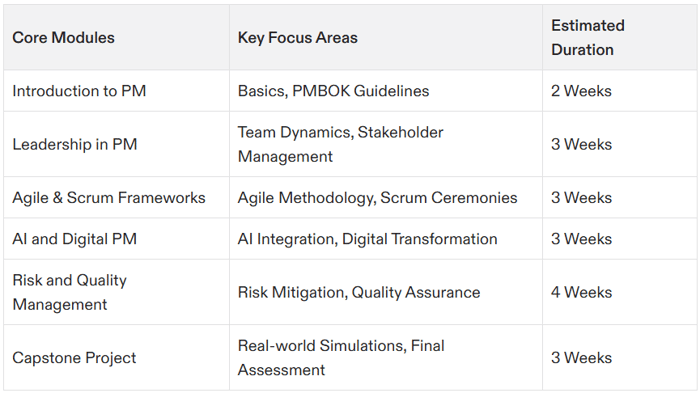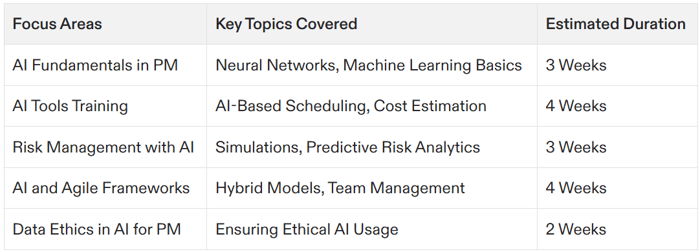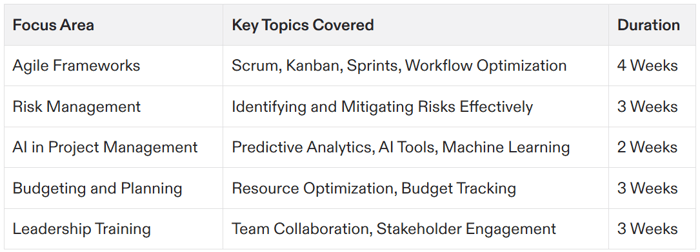Table of Contents
- Why Project Management Certification Accreditation Matters More Than Ever in 2025
- What Exactly Is Project Management Certification Accreditation?
- Why Choose an Accredited Project Management Certification in 2025?
- How to Identify Accredited Project Management Certifications
- Issuing Body Recognition: Go Beyond the Acronyms
- Curriculum Relevance: Modern Methodologies are Key
- Continuous Updates: Stale Content is a Red Flag
- Multiple Career Levels: A Program for Every Stage
- Transparency: Accreditation Should Be Clear and Accessible
- Instructor Qualifications
- Assessment Methods
- Student Support Services
- Key Learning Components in Accredited Certifications
- 10 Less Commonly Known Facts About Project Management Certification Accreditation:
- Final Thought
- FAQs
In the dynamic world of project management, staying ahead means more than just knowing the basics. It's about demonstrating expertise, credibility, and a commitment to excellence. That's where Project Management Certification Accreditation comes into play. In 2025, with the project landscape more competitive than ever, accreditation isn't just a nice-to-have; it's a must-have for ambitious project managers looking to make a significant impact.
Why Project Management Certification Accreditation Matters More Than Ever in 2025
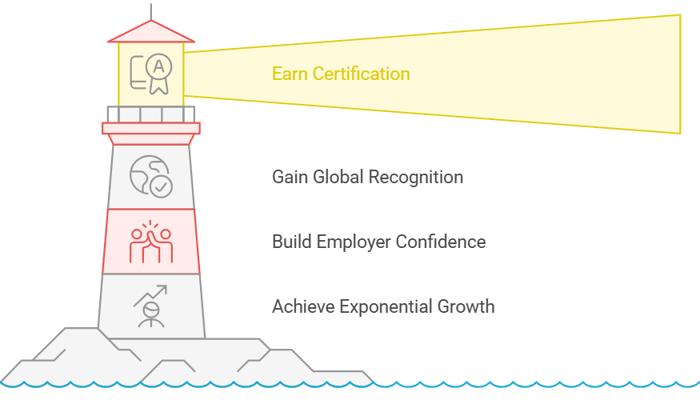
Earning a project management certification is a fantastic first step. It shows you've got the foundational knowledge. But accreditation? That's what elevates you from a good project manager to a sought-after, world-class leader.
Think of it this way: a certification says you've learned the rules of the game. Accreditation proves you can play – and win – at the highest level, adhering to global standards and best practices.
Here's the bottom line:
Global Recognition: Accreditation ensures your training aligns with universally accepted standards, opening doors to international projects and collaborations.
Employer Confidence: Companies actively seek accredited professionals, knowing they possess the skills and knowledge to deliver high-quality results consistently.
Exponential Growth: An accredited certification significantly boosts your career prospects, earning potential, and overall credibility in the industry.
In 2025, with organizations demanding top-tier talent, choosing an accredited credential is no longer optional; it's essential for long-term career success.
For an in-depth look at project management certification, explore our Complete Guide to Project Management Certification.
What Exactly Is Project Management Certification Accreditation?
Project Management Certification Accreditation is the formal recognition granted to a certification program by a credible third-party organization. This recognition signifies that the program meets stringent educational and professional standards, offering learners relevant, high-quality training.
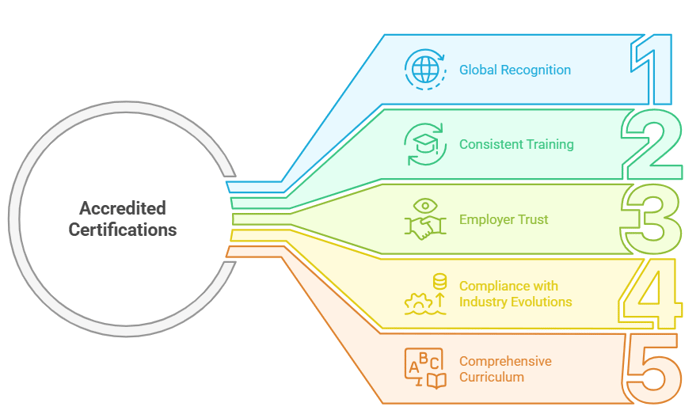
Key Features of Accredited Certifications:
Global Recognition: Demonstrates that the certification meets international benchmarks, allowing you to confidently work across diverse sectors worldwide.
Consistent Training: Ensures you're learning methodologies, frameworks, and tools endorsed by leading regulatory bodies.
Employer Trust: Signals to employers that you've undergone rigorous training, making you a more attractive candidate.
Compliance with Industry Evolutions: Accredited programs regularly update their content to reflect the latest trends and innovations in project management.
Comprehensive Curriculum: Delivers extensive training that encompasses a wide range of project management principles, tools, and techniques.
For example, the APMIC certification, known for its comprehensive curriculum of 400+ modules, is widely respected for providing cutting-edge project management training.
For professionals interested in Lean Six Sigma methodologies integrated with project management training, explore Your Ultimate Guide to SSGI Project Management Certification for additional learning paths that complement CPCC certification.
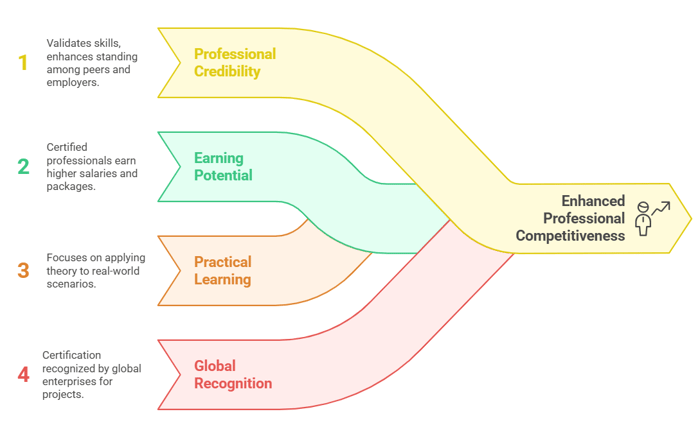
Why Choose an Accredited Project Management Certification in 2025?
Pursuing an accredited certification offers numerous advantages that can significantly impact your professional trajectory. Here's why it makes all the difference:
1. Amplified Professional Credibility
An accredited certification is a powerful signal that you've undergone rigorous training to develop practical project management skills. It validates your competence and boosts your professional standing among peers and employers. It's the gold standard stamp that sets you apart.
2. Enhanced Earning Potential
Global salary surveys consistently show that certified professionals earn more than their non-certified counterparts. The added credibility of accreditation further amplifies your market value, positioning you for higher salaries and better compensation packages.
3. Confidence in Practical Learning
Accredited programs prioritize practical application, ensuring that learners not only understand theory but can also apply concepts effectively in real-world scenarios. The curriculum is designed to include hands-on experiences, preparing you to tackle complex challenges head-on.
4. Recognition by Global Enterprises
Accredited certifications are often prerequisites for organizations, particularly those running large-scale, cross-functional, or international projects. Accreditation serves as a universal "stamp of approval" that guarantees your competence and readiness to contribute to high-stakes initiatives.
Pairing your accredited credentials, such as an APMIC certification, with relevant job experience creates a powerful combination that enhances your portfolio and ensures you stay competitive in today’s demanding job market.
How to Identify Accredited Project Management Certifications
Not all certifications carry the weight of formal accreditation. To ensure you're investing in a program that genuinely meets global standards and enhances your career prospects, diligently verify the following parameters:
Issuing Body Recognition: Go Beyond the Acronyms
Confirm Endorsement: Don't just assume that a well-known name guarantees accreditation. Actively confirm that the certifying entity (e.g., PMI, IPMA, APMIC) is explicitly endorsed by trusted global accreditation bodies.
Check Accreditation Body's Reputation: Research the accreditation body itself. Is it globally recognized and respected? Does it have a history of rigorous evaluations? Look for accreditation bodies that are members of organizations like the International Accreditation Forum (IAF).
Verify Scope of Accreditation: Understand what aspects of the certification are actually accredited. Does the accreditation cover the curriculum, the instructors, the assessment process, or all of the above?
Cross-Reference Information: Compare the information provided by the certification program with the accrediting body's official website. Look for consistent details and avoid relying solely on marketing materials.
Curriculum Relevance: Modern Methodologies are Key
Agile, Scrum, and Hybrid Focus: Accredited certifications should prioritize modern methodologies. A strong emphasis on Agile, Scrum, and Hybrid approaches is a sign that the program is current and relevant to today's project management landscape.
Beyond the Buzzwords: Look for evidence of how these methodologies are integrated into the curriculum. Does the program offer hands-on exercises, case studies, or simulations that allow you to apply these concepts in real-world scenarios?
Emerging Trends: Does the curriculum address emerging trends like remote project management, AI in project management, and sustainability? A forward-looking curriculum demonstrates a commitment to staying ahead of the curve.
Continuous Updates: Stale Content is a Red Flag
Frequency of Updates: Ask how frequently the program updates its modules to include industry advancements. Ideally, the program should be updated at least annually.
Industry Advisory Boards: Inquire whether the program has an industry advisory board or panel of experts who provide input on curriculum development. This is a good indication that the program is aligned with current industry needs.
Version Control: Check if the program clearly identifies the version number or date of the current curriculum. This can help you ensure that you are accessing the most up-to-date materials.
Multiple Career Levels: A Program for Every Stage
Beginner to Advanced Options: Look for programs that offer options tailored to your experience level. A good program will have tracks for beginners, intermediate professionals, and advanced project managers.
Stackable Credentials: Consider programs that offer stackable credentials, allowing you to build upon your knowledge and skills over time. This can be a great way to demonstrate continuous professional development.
Specializations: Does the program offer specializations in specific areas of project management, such as IT, construction, or healthcare? This can help you tailor your training to your specific career goals.
Transparency: Accreditation Should Be Clear and Accessible
Clear Disclosure: Accredited programs should prominently display their accrediting bodies on their websites and marketing materials.
Easy Access to Information: Accreditation information should be easily accessible. Look for a dedicated section on the program's website that provides details about the accreditation status, scope, and validity.
Contact Information: The program should provide contact information for the accrediting body, allowing you to independently verify their accreditation status.
Avoid Vague Claims: Be wary of programs that make vague claims about accreditation without providing specific details or evidence.
Instructor Qualifications
The instructor should have an Accredited certification.
The instructor should have experience in their field.
The instructor should have a good reputation and a history of positive student feedback.
Assessment Methods
The program should use a variety of assessment methods to evaluate students' learning, such as exams, projects, and presentations.
The assessment methods should be aligned with the learning objectives of the program.
The assessment methods should be fair and reliable.
Student Support Services
The program should provide students with access to a variety of support services, such as tutoring, mentoring, and career counseling.
The support services should be readily available and easy to access.
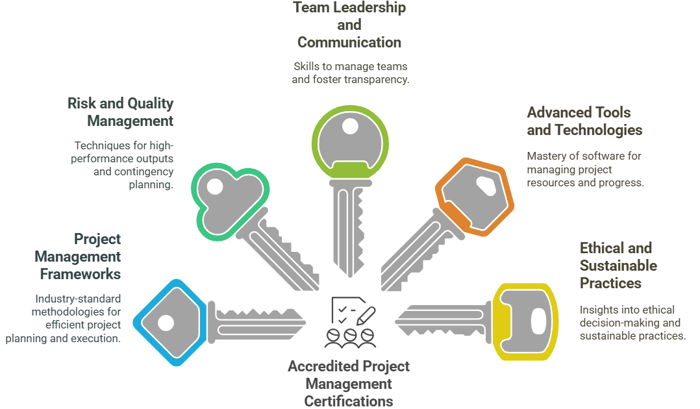
Key Learning Components in Accredited Certifications
Accredited project management certifications typically cover a comprehensive range of essential topics, including:
Project Management Frameworks: Industry-standard methodologies like PMBOK, Agile, and Lean for efficient project planning and execution.
Risk and Quality Management: Advanced risk assessment models, contingency planning, and quality assurance techniques for consistently high-performance outputs.
Team Leadership and Communication: Development of leadership skills to manage cross-functional teams and foster transparency and trust throughout the project lifecycle.
Advanced Tools and Technologies: Mastery of tools like Jira, Microsoft Project, and other software critical for managing schedules, resources, and reporting project progress.
Ethical Project Management Practices: Insights into ethical decision-making and compliance with global regulatory standards, ensuring projects meet societal and business objectives.
Sustainability in Project Management: Understanding the growing importance of sustainable practices in project management, including environmental considerations, social responsibility, and economic viability.
Data Analytics for Project Managers: Utilizing data analytics to improve project performance, make informed decisions, and identify potential risks and opportunities.
Remote Project Management Strategies: Learning effective strategies for managing remote teams and projects, including communication, collaboration, and performance tracking techniques.
Change Management: Understanding and implementing effective change management strategies to ensure project success and stakeholder buy-in.
Artificial Intelligence (AI) in Project Management: Exploring the potential applications of AI in project management, such as automating tasks, improving decision-making, and enhancing project outcomes.
10 Less Commonly Known Facts About Project Management Certification Accreditation:
Accreditation bodies are not all created equal. Some have stricter standards and more rigorous evaluation processes than others. It's important to research the accrediting body itself. (Source: ANSI National Accreditation Board)
Accreditation can impact insurance liability. Some insurance companies offer lower rates to organizations employing project managers with accredited certifications due to the reduced risk associated with standardized practices.
Accredited programs often require continuing education. To maintain accreditation, certification programs must demonstrate a commitment to ongoing improvement and incorporate the latest industry trends into their curriculum. (Source: International Accreditation Forum)
Accreditation boosts employee morale. Knowing that their company values accredited training can increase employee satisfaction and reduce turnover. (Source: Society for Human Resource Management)
Accreditation can influence government contracts. In some countries, government agencies prioritize or even require accredited certifications for project managers working on public projects. (Source: European Commission)
Final Thought
In conclusion, Project Management Certification Accreditation is a vital component for career advancement in 2025. It not only validates your skills and knowledge but also enhances your credibility, earning potential, and recognition in the global project management landscape.
Ready to take your project management career to the next level? Check out our best PMP Certification Prep Course at APMIC and unlock your full potential!
FAQs
What is the difference between project management certification and accreditation?
A certification confirms that an individual has completed training and passed an exam in project management. Accreditation, on the other hand, ensures that the certification itself meets global quality standards and is recognized by industry authorities.
Why is accreditation important for project management certifications in 2025?
With increasing competition in the project management field, employers and organizations prioritize accredited certifications to ensure consistency, credibility, and adherence to industry best practices.
How can I verify if a project management certification is accredited?
To confirm accreditation, check if the certification is endorsed by reputable bodies like PMI, IPMA, or APMIC. Additionally, research the accrediting body’s legitimacy and verify the program details on their official website.
What are the career benefits of obtaining an accredited project management certification?
Accredited certifications enhance professional credibility, increase earning potential, provide global recognition, and improve job opportunities by ensuring the certified individual meets industry-wide competency standards.
Which project management methodologies should an accredited certification cover?
A strong accredited program should include methodologies like Agile, Scrum, Lean, PMBOK, and Hybrid models, as well as emerging trends such as AI in project management and remote team strategies.



